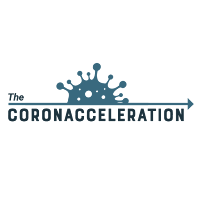The Coronacceleration: The move to digital money and digital gold, while Bitcoin tracks the stock market

This post was also published on LinkedIn Pulse. A series on the latent trends that have been accelerated by the Coronavirus Bitcoin advocates have long claimed that Bitcoin was the ultimate hedge against fiat currencies printing unlimited amounts of money. We just experienced this scenario: the U.S. Federal Reserve is buying “unlimited” amounts of debt , and the U.S. Treasury is spiking its debt load to $25 trillion while promising to pay almost nothing in interest . Bitcoin should be spiking relative to the U.S. Dollar due to the debasement of the world’s primary reserve currency. What has actually happened is that the stock market has risen, and Bitcoin has followed the stock market. Inflation increases asset prices and Bitcoin is clearly now a dollar-based asset, much like a tech stock. Especially over the past year, the same type of people that trade Bitcoin also trade tech stocks, and yesterday’s Bitcoin halving had the zeal of a tech stock split. It is now evident that prin...